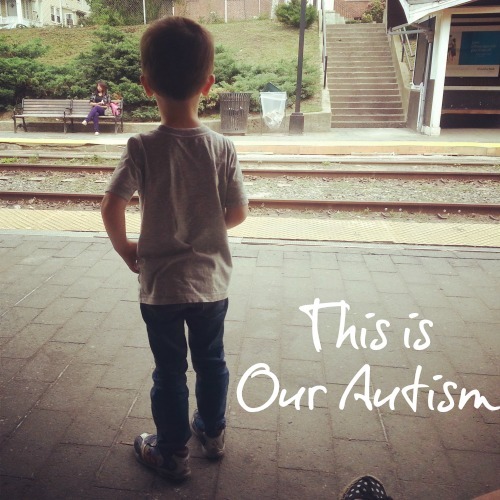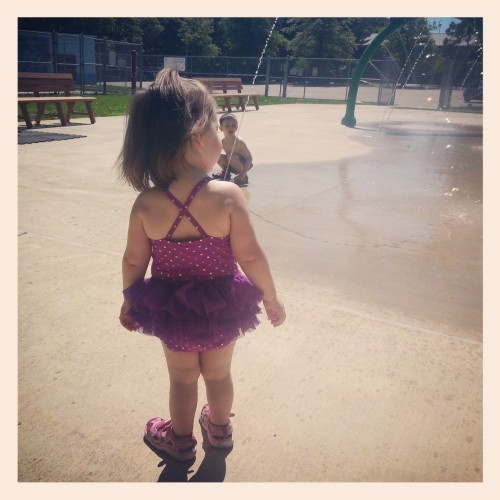Autism is all we know in our house. Maybe someday I will know what normal children of a certain age do. Maybe not.
Our autism right now is a 4-year-old getting ready to turn 5, getting ready to start kindergarten. He is adorable and sweet, and it's not just me that thinks so. It's his teacher and therapists in their IEP reports, it's the people who sat in front of us on the subway and kept turning around to comment on him. It's just who he is. It is also, to some extent, his autism. He is always a babe in the woods, always naive; he does not know how to hide what he thinks and feels.
He is vulnerable, but also aloof. If the bossy neighborhood girl his age slights him, he does not notice. He is still oblivious to most social signals. Though this is sometimes a strength, as it's led to him engaging children he doesn't know. He wants someone to play with him, so he just goes up and asks them -- it is a simple formula for him. If other kids ignore him, he usually doesn't notice.
We have left behind that mysterious boy he was as a baby and toddler, the one who existed in a different orbit, whose meltdowns were random and raging. Now he is in so many ways a regular kid, but in so many ways not like them at all.
He lacks a lot of the things people associate with autism now. He does have his obsessions, but they're relatively minor. He loves trains and cars, he likes to have one with him, but he does fine without them. He doesn't have his collection organized or names memorized. He just likes them to an unusual degree.
If you know what you're looking for, though, you see it. Right away. I say, "Graham, look at me," and while his eyes sweep past me he will not look. His eyes dart all around but won't land on my face. If he is calm and I say it again, then I get his eyes, they lock with mine for a few lovely seconds, he may smile, but he is happier when his eyes wander off again.
And there is that quirkiness, that way of talking that doesn't have the ease and attempts of cool that even little kids adopt to try and be big kids.
He wears every feeling. His heart is not just on his sleeve; it covers him from head to toe.
His emotions are ramped up. Anger and frustration are things he has no idea how to process. Happiness manifests physically. Anxiety is his most common emotion, though, the one I worry about. If his sister cries, he gets upset and is crying, too, within seconds. Not because he is sad, but because it rattles him.
He says, "I love you, Mom," every day. Unprompted. He wants cuddles. He wants to sleep in my bed. Every night. He is sensitive, talkative, inquisitive.
Our autism is also a 2-year-old. She is, in strange ways, both more and less autistic than her brother. She is still new to the therapy he has done for years. She is just barely starting to figure out this whole language thing. She is hitting her stride, hitting that uphill climb I remember well from her brother. Bursts of progress and language.
She likes the grown-ups she knows, she happily babbles incoherently when one comes and finds something of interest to show them. She isn't as interested in kids. Except her friends at day care. Those are her people. That's pretty much how she sees the world: her people. It's not that there's her people and everybody else. There's just her people. Other people do not exist.
She wants. She wants so many things. That is life as a 2-year-old. But her language skills are those of a girl half her age. When she wants something, even something she knows how to say, she often won't use that word.
She is unpredictable, sometimes moody, and can go from happy to livid in moments. Getting to livid usually happens the same way. She wants something; she can't or won't say what it is; any gestures or language she uses are unclear; attempts to figure out her request only get her more angry. In those situations, even when you find the thing she wanted, she will often refuse it anyway. Only to accept it again a few minutes later.
She lives in her own world until she wants something. Though the walls of this barrier are starting to come down. When she changes, it is not gradually but all at once. One day she was suddenly, startlingly clingy. And that is how she's been ever since. She wants hugs, she wants cuddles, she wants to be carried. This from the baby who spent over a year avoiding cuddles, rocking, all those joys you normally get from your little one.
She is quiet and hangs back. She is an observer. Though once she's alone she is happy to be the center of attention.
She has no obsessions, never has. Her interests change constantly. She likes whatever her brother is playing with. She likes girly things, especially if they're pink or if jewelry is involved. She wants badly to ride her brother's bike.
She is learning to dance. She is starting to try and sing along.
Her autism is tucked in nooks and crannies rather than visible on the surface. Her eye contact is definitely decreased, but is getting better every day. Most people, and this includes people who know her well, think her diagnosis is silly or absurd or unjustified. Even I spent a long time not being sure but knowing something was off.
I worry that people look at our autism and think it is not really autism. My kids are both mild and will hopefully need services at school for only a few years and then grow beyond them. I know we have a different experience from those who deal with aggression or obsession or an inability to speak. But I worry that kids like mine are the reason people think that autism diagnoses are handed out like candy. That they're just late talkers or just kind of quirky.
Our autism is no longer a thing that brings me to my knees constantly. It is growing and changing every day.
This piece is part of a series of essays on what autism looks like for different families. It originally appeared on Don't Mind the Mess.
 Like Us On Facebook |
Like Us On Facebook |
 Follow Us On Twitter |
Follow Us On Twitter |
![]() Contact HuffPost Parents
Contact HuffPost Parents
Also on HuffPost:


